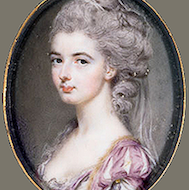Part 2.8 is the conclusion of Chapter 2.
A Childhood at Versailles consists of the first 5 chapters of the memoirs of Mme de Boigne (1781-1866), née Adèle d’Osmond, who was a French salon hostess and writer. She was born in the Château de Versailles and lived at the court of Louis XVI and Marie-Antoinette until her family fled to England during the Revolution. Later in her long life, she married a rich soldier of fortune 30 years her senior, hosted a brilliant salon in Paris, and became an intimate of the last French queen, Marie-Amélie, consort of King Louis Philippe (r. 1830-1848). Childless herself, Mme de Boigne addressed her memoirs to her grandnephew. The memoirs were not published until 1907, under the title Récits d’une tante, or An Aunt’s Tales. They’ve never been published in English, as far as I know, so I’ve decided to translate the first 5 chapters, the ones that take place mainly at Versailles, and post them here on this blog for interested readers to enjoy for free.
The chapters are quite lengthy, so I’ve broken each one into several parts. In Part 2.8, the conclusion of Chapter 2, the author recounts the novel-worthy career of Mme de Victoire’s remarkable lady-in-waiting, Mme de Civrac.
A Childhood at Versailles, Chapter Two, Part 8 (2.8)
I have said that Mme de Civrac was Madame Victoire’s lady in waiting. Her life is a novel.
Mlle Monbadon, the daughter of a Bordeaux notary, had reached the age of twenty-five. She was tall, witty, and, above all, ambitious. Her hand in marriage was sought by a country squire in the neighbourhood whose name was M de Blagnac. He was a member of the bodyguard. This man was poor, quite rustic, and incapable of appreciating her merits, but he wished to share the little fortune that she stood to inherit from her father.
The person who put the marriage forward emphasized M de Blagnac’s birth; he was a member of the house of Durfort. Mlle Monbadon had the genealogical papers brought, and, satisfied by her inspection of them, married M de Blagnac.
Packing a small bag in addition to the portfolio in which she enclosed the genealogical parchments, she set off in a stage coach with her husband, and arrived in Paris. Her first visit was to Chérin; she handed the papers over to him, and asked him to examine them scrupulously. A few days later, she came back to collect them and obtained the assurance that the affiliation of M de Blagnac with the Lorge branch of the house of Durfort was thoroughly established. She had a certificate to that effect delivered to her, and began to have herself called Blagnac de Civrac. She wrote to the old Maréchal de Lorge to ask an interview of him. She very modestly said that she was only passing through Paris, and she believed that her husband had the honour to be related to him. As distant as the connection might be, it was such a great honour and source of happiness that she did not wish to return to her provincial obscurity without having claimed it. If she dared to push her claims as far as being received just once by Mme la Maréchale, her gratitude would be beyond measure.
The Maréchal allowed himself to be taken in by these honeyed words, though without putting too much stock in the presumed relationship, which she did not insist on. She was authorized to make a visit, during which she conducted herself adroitly. Having obtained permission to come back to take her leave, she came back. Her departure was put off, and she came back again. In fact, she did not leave at all. Soon the Maréchale was taken with her; sitting on a small stool at her feet, Mme de Blagnac worked on the same tapestry and became a regular visitor to the house. The husband hardly appeared at all. One day, her credit already established, she overheard a casual remark about the bodyguards; she lifted her head with an expression of surprise.
When she was alone with the Duc de Lorge, she said, “Monsieur le Maréchal, I’m afraid that in our provincial ignorance we have been guilty of a great fault with regard to you since one of your relations is a bodyguard. Is it unseemly?” M de Lorge responded in a friendly manner, while gently declining to acknowledge the family connection. “My goodness,” she said, “I don’t know anything about that, but I shall bring you my husband’s papers.” She did indeed bring the papers, which were all in order with Chérin’s certificate. There was nothing to be said against them, and, in any case, there was no longer any desire to do so.
The husband was removed from the bodyguard, put in a regiment, and sent off to a garrison. The wife had a small mezzanine room at the Hôtel de Lorge. The Maréchal de Lorge had no son. The Maréchal de Duras had only one, who already promised to be a bad sort. Mme de Blagnac’s pregnancy began to be accommodated, and the little stool became an armchair. Soon she was called nothing other than Mme de Civrac, the Lorge branch’s secondary title. Finally, after only a few months, she was on such a good footing in the household that she was in command of everything, while always maintaining the most respectful deference towards M and Mme de Lorge. The Duras branch shared the infatuation that she inspired in the Lorges.
When Madame Victoire’s household was formed, she was named one of her ladies. Soon she became her favourite, then her chief lady-in-waiting. It was then that she was created Duchesse de Civrac.
She had always maintained the best relations with her husband, whom she loaded with marks of consideration; however, he was too stupid to be able to turn them to account when he was present. She succeeded in having him named ambassador to Vienna, where he promptly had the good grace to die. It was the only proof of intelligence he had ever given in his life. He left her the mother of three children, a son, since Duc de Lorge and the inheritor of the fortune of that branch of the Durforts, and two daughters, Mmes de Donissan and de Chastellux.
Mme de Civrac, who was as able as she was witty, wanted in her turn to be a patroness when she came into this great fortune. She turned herself into the protectress of Bordeaux. Everyone who came from there was sure of finding her support, and she thus succeeded in improving the lot of her own family. Little by little, the Monbadons became MM de Monbadon. Her nephew entered the army, was named a colonel, and ended up being almost a lord at Court.
It was after this success, at the apogee of her grandeur, that she happened to be taking the waters in the Pyrenees. A list of newly promoted colonels was received. Mme de Civrac expatiated on the unsuitability of the choices. A grand old lady of the province replied to her, “What’s to be done, Madame la Duchesse? To each his own Badon!”
The ambitious Mme de Civrac had succeeded in everything, but she was insatiable. Already quite ill, she believed she had all but arranged the marriage of her son, the Duc de Lorge, to Mlle de Polignac, whose mother was then all-powerful, to take place in the near future, and had made it a condition that her still very young son would be given the post of captain of the guards. At the moment that the bargain was about to be concluded, Mme de Gramont, who was equally an intriguer, struck. She had the merit in the Queen’s eyes of having been exiled by Louis XV for being insolent to Mme du Barry. Her claims were supported by the Choiseuls, the Queen preferred her son, and thus the balance was tipped.
Mme de Civrac suddenly learned that the young Gramont18, a regimental sub-lieutenant, had arrived at Versailles, that he had been created Duc de Guiche and made captain of the guards, and that his marriage to Mlle de Polignac had been announced. She fell into such a rage that her blood became inflamed, and within forty-eight hours she expired of an illness that would not have heralded such a rapid ending.
Mme Victoire, much afflicted by this loss, named Mme de Chastellux her chief lady-in-waiting, as she had promised her mother. Mme de Donissan was already one of her ladies.
This Mme de Donissan, who is still alive at the age of ninety-two, is the mother of Mme de Lescure. Both of them acquired an honourable and sad celebrity during the first war in the Vendée, in which both of them took a most active part, without departing from the character of their sex. Mme de Lescure’s memoirs of those events recount the glory and the misfortunes of that campaign in a way that is both touching and truthful. They were written by M de Barante as told to him by Mme de Lescure (later Mme de La Rochejaquelin) during the time that he was the prefect of Morbihan.
Notes:
18. Louis Antoine, Duc de Gramont, general, created a Peer of France at the Restoration (1755-1836). Nephew of the Duchesse de Gramont, sister of the Duc de Chisel, guillotined in 1794 (1730-1794).
There will now be a pause of about 2 weeks while I spend Easter in Paris. Look for Part 3.1 in the second week of April!


















Leave a Comment